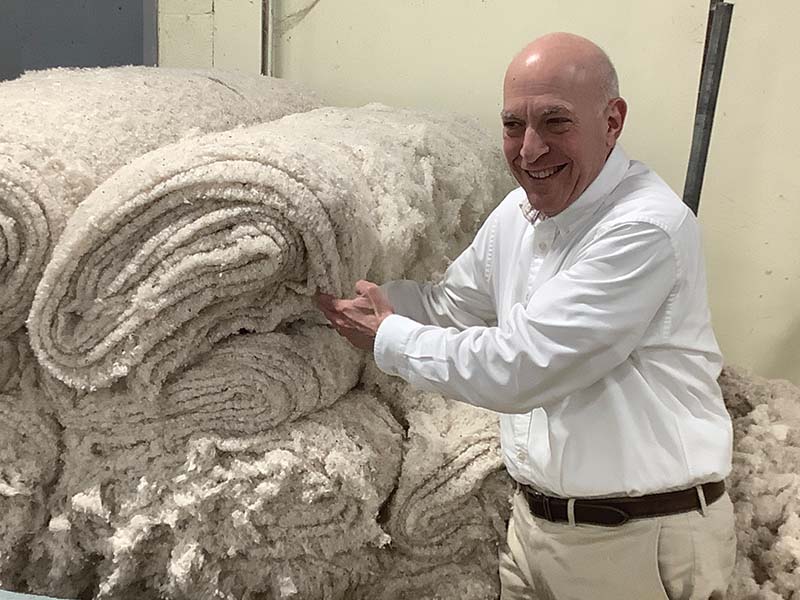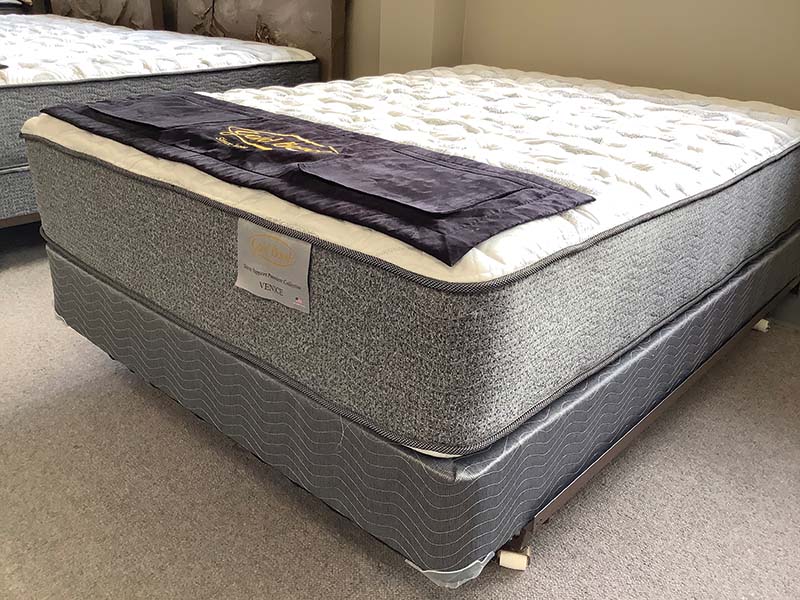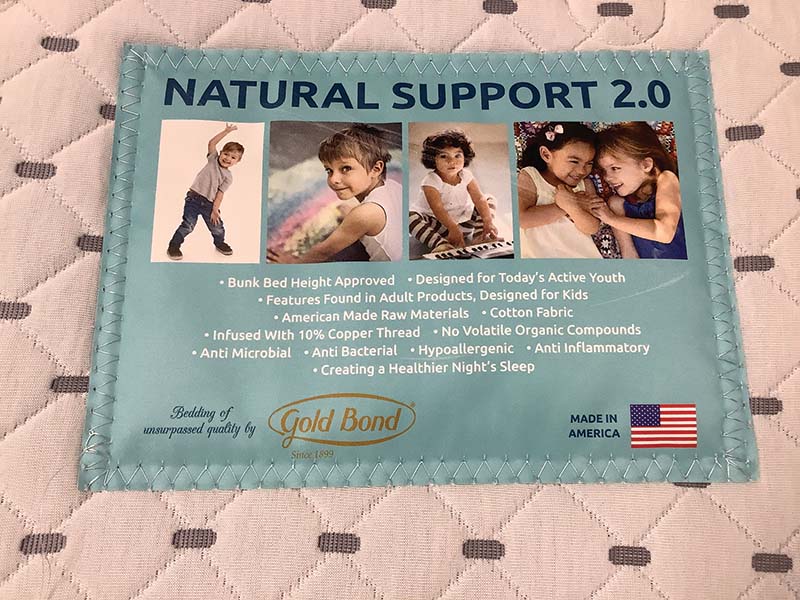Emphasis on quality and service continues to pay dividends for independent, family-owned bedding producer
Is it time to sell Gold Bond mattresses online? The question hangs in the air for a few moments in the Gold Bond showroom in Hartford, Connecticut, where four generations of the Naboicheck family have built Gold Bond into an independent bedding producer.

And then Bob Naboicheck, the company’s president, delivers his verdict, flatly dismissing the notion that Gold Bond would follow other bedding producers and sell its products online. He summons more than a century of familial bedding experience to bolster his answer.
“One of the reasons we are 122 years old is that we stick with what we have been doing for 122 years,” he says. “We won’t sell on the internet. We don’t want to compete with our retailers, and they know that and appreciate that.”
“Commitments like that made our company,” he continues. “You have to be able to look yourself in the mirror in the morning.”
The company’s founder, Isadore Naboicheck, established the tradition of commitment and quality, in 1899, when he began blending cotton and making mattresses in a four-story brick building by the Connecticut River in Hartford. The two Naboichecks who followed in Isadore’s footsteps carried it on.
“Quality and superior service have been and will be our tradition,” Bob Naboicheck says of the company that now occupies its third location, this one within sight of the spires of commerce and religion in downtown Hartford. Those are not just platitudes; they are the soul of the company.
That soul has propelled the company to success as a leading independent bedding maker, one that has eschewed the mergers and acquisitions that have swept through the mattress industry in recent decades, transforming a once highly fragmented industry into one in which a handful of companies now controls about half of the domestic bedding marketplace.
Heartbeat of the company
The springs in the foreground will be secured into coil box springs used with many Gold Bond mattresses. Gold Bond attaches tempered steel springs to the outside of encased coil mattresses to provide support and durability to the units.
Gold Bond remains a family-owned business and is thriving because its formula of quality components, traditional production techniques and a commitment to its customers remains as potent today as it was more than a century ago, Naboicheck says.
His father, Butch, a former president of the National Association of Bedding Manufacturers, the precursor to the International Sleep Products Association, followed the same formula.
“It would be easy to take some of the quality out of our mattresses,” Butch Naboicheck said in the 1950s, recorded on the company website, “but why remove what makes our mattresses great? We’re sticking to what my father started. Our customers expect it.”
The heartbeat of the company remains the same today.
Some people think Bob Naboicheck is unwise to keep focusing on top-quality bedding components, he says. But he insists that Gold Bond will keep doing what it has been doing, using the time-tested, traditional components that go into its mattresses, such as layers of cotton and wool, sturdy innersprings and border rods, natural latex, and steel box springs mounted on Canadian spruce wood frames.
That unswerving commitment to quality and heritage will continue to give the company an edge in an industry that has experienced major changes in recent years, Naboicheck says. Suppliers have become bedding makers, and bedding makers have become bedding retailers. Moves like that were once unheard of in the bedding arena.
A foray into futons

Gold Bond is sticking to its role as a mattress maker — and as a futon maker. Decades ago, the company made an aggressive push into futons, helping to establish that category in the home furnishings industry.
Butch and Bob Naboicheck realized in the 1980s that futons could meet consumers’ needs in the bedroom, den, home office, living room or guest room, and could do so with more comfort and less expense than rollouts or sofa sleepers. So, they transformed a product that consumers had associated with thin Japanese mats into something plusher and more comfortable, using the same premium materials they used in their mattresses. It was a natural line extension for Gold Bond, Naboicheck says, but it is a step that few bedding makers have taken.
Today, the futon line remains an important part of the product mix at Gold Bond. Gold Bond ships its futons to dozens of countries around the world, he says.
Both sides
Gold Bond retains its commitment to two-sided mattresses, once the norm in the industry but now largely replaced with single-sided models. Naboicheck has a clever endorsement of two-sided beds: “Two of something is better than one of something.”
Gold Bond’s mattresses are two-sided models. That design gives the company’s beds more durability, and consumers greater product satisfaction, he says.
A natural salesman, Naboicheck loves to point out features that Gold Bond builds into its mattresses: heavy, tempered steel springs attached to the exterior of the spring systems to ensure firm edges that last; thick layers of cotton instead of polyurethane foam to provide natural cushioning; layers of natural Talalay latex (made down the road at Talalay Global in Shelton, Connecticut); needle-punched wool pads used as insulators in some models; and wool in the quilting layers.
Heavy lifting

Those components all add up to heavy beds. Gold Bond’s mattresses weigh as much as 200 pounds in king. “Pick up our mattresses,” Naboicheck says. “Those components are sold by weight.” More weight equals higher quality, he adds.
Gold Bond is one of the few bedding makers to still garnet its own cotton, a time-consuming process. One of the company’s six garneting machines dates to 1927.
Each year Gold Bond buys 3.5 million pounds of raw, long-fiber cotton from several southern states. Once the big bales are opened in a picker, the cotton fibers are dropped into a hopper. From there they go into the garneting machine, where wheels driven by leather belts process the material into thin layers that are rolled one upon the other as a conveyer belt moves back and forth.
The finished batts of cotton provide natural, superior cushioning in mattresses and futons, Naboicheck says.
A future in the family’s hands

Many family members have worked for the company over the years; Bob Naboicheck and his son, Skip, are the only ones involved today. Bob hopes that Skip, the fourth generation of Naboichecks at Gold Bond, will run the company someday, keeping his family’s bedding legacy alive.
Skip, vice president, plays a key role at the company, handling a variety of administrative operations, thus freeing his father to pursue a heavy travel schedule that takes him around the country for sales training sessions and other meetings with retailers.
The two share an intense focus on preserving the company’s traditions of quality and service.
“As other companies cut corners, we will continue to do what we have always done best,” Naboicheck says. “It’s what sets Gold Bond apart in the marketplace. Whether it’s building mattresses or futons, or simply answering the phone and taking care of our customers, Gold Bond is all about exceeding our customers’ expectations.”
It’s a formula that has stood the test of time at Gold Bond, even as other bedding independents have exited the market.
“It’s sad to see other independents go out of business,” Naboicheck says. “We are one of the last independents still standing. It’s a different world today.”
He and Skip are determined to keep Gold Bond on a solid footing for many years to come.






